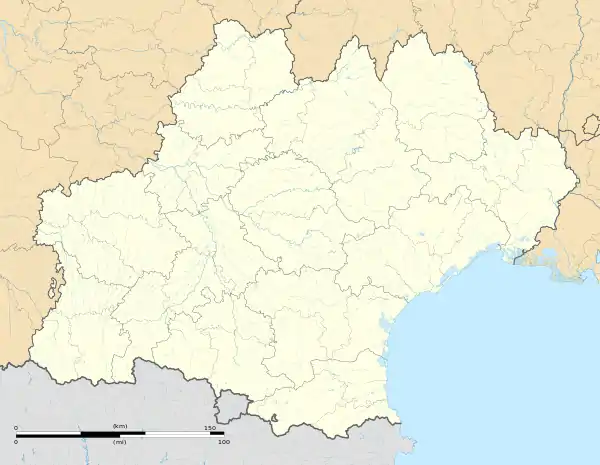Vérargues
Vérargues (French pronunciation: [veʁaʁɡ]; Provençal: Verargas) is a former commune in the Hérault department in the Occitanie region in southern France. On 1 January 2019, it was merged into the new commune Entre-Vignes.[2]
Vérargues | |
|---|---|
Part of Entre-Vignes | |
 An old postcard view of Vérargues | |
 Coat of arms | |
Location of Vérargues | |
 Vérargues  Vérargues | |
| Coordinates: 43°43′02″N 4°06′01″E | |
| Country | France |
| Region | Occitania |
| Department | Hérault |
| Arrondissement | Montpellier |
| Canton | Lunel |
| Commune | Entre-Vignes |
| Area 1 | 5.51 km2 (2.13 sq mi) |
| Population (2019)[1] | 749 |
| • Density | 140/km2 (350/sq mi) |
| Time zone | UTC+01:00 (CET) |
| • Summer (DST) | UTC+02:00 (CEST) |
| Postal code | 34400 |
| Elevation | 15–65 m (49–213 ft) (avg. 80 m or 260 ft) |
| 1 French Land Register data, which excludes lakes, ponds, glaciers > 1 km2 (0.386 sq mi or 247 acres) and river estuaries. | |
Climate
The climate is hot-summer Mediterranean (Köppen: Csa).[3] The average annual temperature in Vérargues is 14.6 °C (58.3 °F). The average annual rainfall is 743.9 mm (29.29 in) with October as the wettest month. The temperatures are highest on average in July, at around 23.8 °C (74.8 °F), and lowest in January, at around 6.5 °C (43.7 °F). On 28 June 2019, during the 2019 European heat wave, a temperature of 46.0 °C (114.8 °F) was recorded in Vérargues, the highest in French meteorological history.[4]
| Climate data for Vérargues, elevation: 56 m (184 ft), 1981–2010 normals, extremes 1980–present | |||||||||||||
|---|---|---|---|---|---|---|---|---|---|---|---|---|---|
| Month | Jan | Feb | Mar | Apr | May | Jun | Jul | Aug | Sep | Oct | Nov | Dec | Year |
| Record high °C (°F) | 22.5 (72.5) |
25.0 (77.0) |
29.5 (85.1) |
33.0 (91.4) |
36.0 (96.8) |
46.0 (114.8) |
39.0 (102.2) |
41.5 (106.7) |
37.5 (99.5) |
33.5 (92.3) |
26.5 (79.7) |
21.0 (69.8) |
46.0 (114.8) |
| Average high °C (°F) | 11.2 (52.2) |
12.6 (54.7) |
16.0 (60.8) |
18.7 (65.7) |
23.0 (73.4) |
27.5 (81.5) |
30.7 (87.3) |
30.3 (86.5) |
25.8 (78.4) |
20.5 (68.9) |
14.9 (58.8) |
11.7 (53.1) |
20.3 (68.5) |
| Daily mean °C (°F) | 6.5 (43.7) |
7.5 (45.5) |
10.4 (50.7) |
13.0 (55.4) |
17.1 (62.8) |
20.8 (69.4) |
23.8 (74.8) |
23.4 (74.1) |
19.6 (67.3) |
15.5 (59.9) |
10.2 (50.4) |
7.2 (45.0) |
14.6 (58.3) |
| Average low °C (°F) | 1.8 (35.2) |
2.3 (36.1) |
4.8 (40.6) |
7.3 (45.1) |
11.1 (52.0) |
14.2 (57.6) |
16.9 (62.4) |
16.6 (61.9) |
13.4 (56.1) |
10.5 (50.9) |
5.5 (41.9) |
2.8 (37.0) |
9.0 (48.2) |
| Record low °C (°F) | −13.5 (7.7) |
−12.0 (10.4) |
−8.0 (17.6) |
−2.5 (27.5) |
2.0 (35.6) |
5.0 (41.0) |
8.0 (46.4) |
6.5 (43.7) |
3.0 (37.4) |
−1.5 (29.3) |
−6.0 (21.2) |
−10.0 (14.0) |
−13.5 (7.7) |
| Average precipitation mm (inches) | 60.7 (2.39) |
50.9 (2.00) |
40.5 (1.59) |
65.4 (2.57) |
54.2 (2.13) |
30.6 (1.20) |
23.4 (0.92) |
43.6 (1.72) |
103.0 (4.06) |
114.2 (4.50) |
86.3 (3.40) |
73.8 (2.91) |
743.9 (29.29) |
| Average precipitation days (≥ 1.0 mm) | 6.3 | 5.2 | 5.4 | 6.9 | 6.5 | 4.5 | 2.6 | 4.1 | 5.4 | 7.3 | 6.7 | 6.4 | 67.4 |
| Source: Meteo France[5] | |||||||||||||
Population
| Year | Pop. | ±% |
|---|---|---|
| 1962 | 178 | — |
| 1968 | 308 | +73.0% |
| 1975 | 348 | +13.0% |
| 1982 | 291 | −16.4% |
| 1990 | 524 | +80.1% |
| 1999 | 446 | −14.9% |
| 2008 | 696 | +56.1% |
See also
References
- Téléchargement du fichier d'ensemble des populations légales en 2019, INSEE
- Arrêté préfectoral 13 December 2018 (in French)
- "Climat Gallargues-le-Montueux: Température moyenne Gallargues-le-Montueux, diagramme climatique pour Gallargues-le-Montueux - Climate-Data.org". fr.climate-data.org. Retrieved 2019-06-29.
- "C'est officiel : On a atteint les 46 °C en France en juin".
- "Vérargues (34)" (PDF). Fiche Climatologique: Statistiques 1981–2010 et records (in French). Meteo France. Retrieved 29 June 2021.
Wikimedia Commons has media related to Vérargues.
This article is issued from Wikipedia. The text is licensed under Creative Commons - Attribution - Sharealike. Additional terms may apply for the media files.